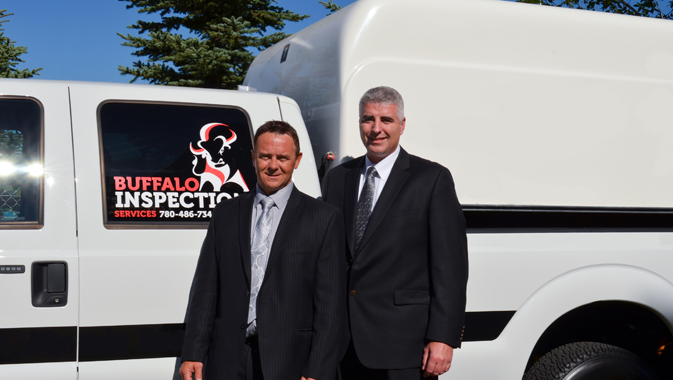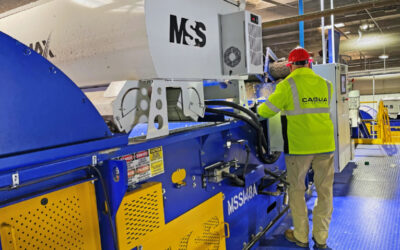Buffalo Inspection Services is the largest non-union non-destructive examination (NDE) company operating in Alberta, British Columbia, Saskatchewan and Manitoba and the work it does is crucial to the safety of the public at large. We spoke with Chief Operating Officer Bari Walsh and Chief Executive Officer Martin Heitkoetter about retaining grassroots values, the difficulty of finding people with the right skill sets and the potential for further growth.
~
Buffalo Inspection Services was started by a buffalo ranch-owning man with a single radiography truck. Thirty-six years later, the small family business has grown into a major player with a reputation to match, offering all discplines of NDE.
Buffalo Inspection Services takes its work very seriously. The company’s highly qualified technicians test and inspect pipeline welds along with all other types of welds and required integrity inspection within the full spectrum of industry via non-destructive examination. Through ultrasonic thickness surveys, internal pitting and corrosion can be detected in storage tanks, pressure vessels or pipelines. A job not done right can also result in issues like pipeline failures which could be a potential harm to the public, to land or watersheds.
“If this type of work was not being performed, then people in general are potentially at risk of being injured, so it’s very critical work.”
The very reason that Buffalo Inspection Services does the work it does is to protect people and the environment. As Bari mentions, quality work is its small contribution to helping protect the planet. “Our footprint is clean and as green as possible. We are an ISO company following ISO 9001 standards.”
Innovation
Regulators around the world have tightened security requirements for using and transporting radioactive sources. The Canadian Nuclear Safety Commission (CNSC), the federal body responsible for regulating the use of nuclear energy and materials, has new security requirements for sealed radioative sources that will be enforced as of May 2014. The USA couterpart, the Nuclear Regulatory Commission (NRC), has similar requirements that all licensees must comply with by March 2014.
Buffalo Inspection Services uses radiation sources extensively and has been working with St. Alberta, AB based M3 Technology to create a radiographic tracking solution. The new regulatory requirements focus on increased administrative controls and technical security measures relating to detection, delay, and response. Buffalo’s solution incorporates these elements but takes it a step further by giving full positional awareness in realtime to the location of the radioactive source and all its movements. With this technology, someone sitting in an office could know the exact location of thousands of radioactive sources anywhere in the world. The technology also makes the recovery of a lost or stolen radioactive device much easier. In the very near future all of Buffalo’s 100+ mobile units will be equipped with this technology, as well as all fixed storage locations.
“We did patent it, so it’s in the process right now and everything is looking good. We have also filed for the PCT (Patent Cooperation Treaty). Our intent is to patent it in other countries as well. This has been attempted by many countries and governments, and nobody has been able to successfully do it until we gave it a go with M3 Technology. Ideally this would be global. In Canada, M3 is going to be spearheading that portion of it, and then as we move out we will most likily align with other people similar to them, and keep an arms length. We don’t get involved in it.”
The company began with family values and, although the original owners are no longer part of the company, these values remain. Many companies claim that employees are like family but that is very much how it is within Buffalo Inspection.
“There are 230 employees in this company, and whether it’s the CEO, COO or CFO, we know all the names. This carries forward with employee retention. We are very proud to have a low turnover. We pick up a lot of technicians from our competitors. Once they join us and see what we are all about, they tend to stay for a long time. Some people have been here for thirty years!”
The company is non-union simply because the system works better with its organization and culture. “We don’t need to be unionized because in fact we act as our own internal union, making sure that everyone is treated fairly. But, we do use unions as a measuring stick as far as wages go. Most of it is somewhat public. It is a way for us to make sure that we are held in check and everyone is on the same page.”
Attitude and culture are discussed frequently as the essence of the company’s success. “Maybe this goes back to union vs. non union. I feel strongly that our people are willing to go that extra mile for our team because we do hold such a focus on understanding each individual as a unique situation and allowing flexibility with certain things going on in their lives and looking outside the box in dealing with potential contentious issues.”
Martin believes that much of the company’s rapid growth has been fuelled by its people. The management team that Buffalo has put in place represents some of the best at what they do. “Truly masters in their craft, whether it be finance, radiation safety, quality assurance and control, IT, sales or our technicians. We have assembled an incredible team together.”
Buffalo Inspection Services operates as a blend of direct corporate employees and contractors. Many of its contractors have extensive experience in the industry.
Buffalo has also created an in-house school to bring up the next generation of NDE technicians. “We are getting some major results with this initiative. This program has only been in place for a year. It’s fairly new to us. The company has been doing it all along informally, but now it’s just more structured.”
This industry requires a very specialized skill set. The biggest challenge that Buffalo Inspection Services faces is to find the right technicians – something that affects the industry as a whole. The company looks for Level 2 technicians.
Natural Resources Canada (NRCAN), which certifies industrial radiography technicians, released statistics in June, 2014 that indicate that Canada only has 2,140 Level 2 certified technicians. That is a very small pool of potential employees.
In addition to its own training, Buffalo Inspection Services sponsors a bursary with the Southern Alberta Institute of Technology (SAIT) program which trains people for entry level positions within industry.
“The way this system is set up, it’s a very challenging program for people to get through. Ideally what we are looking for is a very hard working academic person who is willing to work out in -40 degree weather, or in a muddy ditch. It’s a unique type of person we are looking for and that program they go through is very challenging.”
Buffalo Inspection Services spends a lot of time creating the next generation of leaders. These committed individuals are the ones who are going to expand the geographical footprint across Canada and, potentially, into the US. “As for growth, the sky is the limit. We know how big some of our competitors are so, simply put, there is that much work out there, and may the best man win!”













